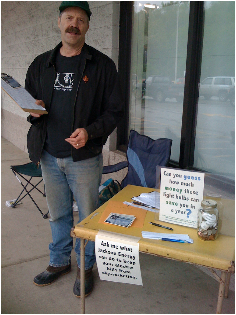This week in Democratic Energy:
Nevada continues to draw battle lines between NV Energy/PUC and Nevada citizens.
Now that the Investment Tax Credit has been extended, the pinch between policy and practice falls on the states.
Community Solar “wins” in Minnesota.
Featured Stories:
Solar potential on public buildings in Kansas City, Minneapolis & New York City by John Farrell, CleanTechnica
The solar tax credit extension will make net metering battles much more intense by Katherine Tweed, GreenTech Media
Sunny Nevada is killing the solar industry in the state with new net-metering rules by Michael Graham Richard, TreeHugger
This might not seem like much until you do the math and realize that these changes would negate the savings on many solar customers’ utility bills. For example, if you are thinking about getting a solar system that would save you $40/month, you might not go solar if the new rules reduce net-metering returns and increase fees by more than $40/month. Some people might still do it just to have clean power, but a lot of people just won’t.
1,000 Nevadans protest retroactive changes to net metering by Christian Roselund, PV Magazine
In Minnesota, community solar shares getting snapped up fast by Frank Jossi, Midwest Energy News
Democratic Energy News Around the Nation:
Arizona
As solar industry matures, subsidies, regulations are changing by Hubble Ray Smith, KD Miner
California
Clean energy and community advocates cheer launch of Clean Power SF by Eric Brooks, San Francisco Bay View
Florida
Utility-backed Florida solar proposal appears headed for 2016 ballot by Herman K. Trabish, Utility Dive
Illinois
Group solar purchases helping Midwest cities cut carbon emissions by Dan Rafter, Midwest Energy News
Iowa
Why Clean Line developers want changes to Iowa’s approval process by Karen Uhlenhuth, Midwest Energy News
“There is no regulatory or legal mechanism in place today that would allow us to use the model that traditional utilities use for smaller local projects where, as long as they are acting prudently, they can recover all their costs,” Cary Kottler of Clean Line said. “That process don’t exist because this is inter-regional infrastructure.”
Lines carrying large amounts of electricity across two or more states are in short supply, a reality that is limiting the growth of large-scale renewable power generation like wind farms, said Kottler, adding, “That’s the gap we are trying to fill.”
Maine
Rooftop solar, net metering the right choices for Maine consumers by Barry Goldwater Jr., Portland Press Herald
As solar power hits milestone, Maine utility wants to end ‘net metering’ policy by Fred Bever, MBPN
Massachusetts
Farmer, Central Hudson spar over solar benefit by John Ferro, Poughkeepsie Journal
Minnesota
Connexus Energy sells out its first, and Minnesota’s largest, community solar garden by David Shaffer, Minneapolis Star Tribune
Scandia officials embrace solar garden project by Mary Divine, Pioneer Press
In Minnesota, community solar shares getting snapped up fast by Frank Jossi, Midwest Energy News
Nebraska
Hold onto public power by Larry Pierce, Columbus Nebraska Telegram
Nevada
Rooftop solar customers: NV Energy pulled a bait and switch by Joe Schoenmann, KNPR
Regulators to consider pausing new rooftop solar rates by Michelle Rindels, The Las Vegas Sun
Sunny Nevada is killing the solar industry in the state with new net-metering rules by Michael Graham Richard, TreeHugger
This might not seem like much until you do the math and realize that these changes would negate the savings on many solar customers’ utility bills. For example, if you are thinking about getting a solar system that would save you $40/month, you might not go solar if the new rules reduce net-metering returns and increase fees by more than $40/month. Some people might still do it just to have clean power, but a lot of people just won’t.
SolarCity cuts 550 Nevada jobs, blames new net metering rate by Sean Whaley, Las Vegas Review Journal
PUC hearing: anger and scolding at first of two meetings by Joe Schoenmann, KNPR
State agency requests reconsideration of new rooftop-solar rate by Sean Whaley, Las Vegas Review Journal
How a solar decision in Nevada could shape the 2016 Presidential results by Samantha Page, Think Progress
Public support for solar in Nevada — as it is in most of the country — is strikingly bipartisan. Across party lines, roughly nine in 10 Americans support solar power, and according to a poll commissioned last spring by The Alliance for Solar Choice (TASC), 69 percent of Republican likely voters and 80 percent of Democratic likely voters would be “unlikely” to reelect a politician who failed to raise the solar net metering cap.
1,000 Nevadans protest retroactive changes to net metering by Christian Roselund, PV Magazine
New Hampshire
New Hampshire voters support solar net metering, oppose solar cap by Solar Industry Magazine
Gov. Hassan pushes lawmakers for expansion of ‘net metering’ program by Dave Solomon, New Hampshire Union Leader
AMC lodge reduces carbon footprint with solar array by Solar Novus Today
Ohio
Construction on 7 MW Ohio energy storage facility slated for mid-October by Becky Beetz, PV Magazine
Texas
Austin Energy poised to launch new distributed energy management system by Robert Walton, Utility Dive
Wisconsin
Let’s use energy efficiency and small-scale generation by John Dunn, Madison Cap Times
Nationwide Democratic Energy News:
Battles over net metering cloud the future of rooftop solar by Richard Martin, MIT Technology Review
Challenges to existing net metering programs are underway in most of the major markets for solar power, including California, Arizona, and New York. Mississippi recently announced a net metering policy that will pay wholesale rates, not retail, for solar power produced by homes and small businesses.Hawaii closed its program to new solar owners in October. Many states are at or near the limits established on total solar capacity allowed under their net metering programs, meaning that new residential installations will not be covered under the compensation system. Nevada maxed out its 235-megawatt net-metering program earlier in 2015, causing installer Viviant Solar to pull out of the state.
Not all of these states will roll back their net metering fees, though. New York, which has undertaken a major restructuring of its electricity sector, actually suspended its cap on solar photovoltaic systems covered by the state’s net metering program in October. Also in October, New Mexico regulators dismissed a proposal by El Paso Electric to impose new fees on solar owners. Regulators in Arizona, where the net metering debate has been sharpest, have declined so far to modify its program as regulators seek a compromise between utilities and solar advocates. And regulators in California are proposing to leave current compensation policies in place.program as regulators seek a compromise between utilities and solar advocates. And regulators in California are proposing to leave current compensation policies in place.
Is solar power contagious? by Sami Grover, Mother Nature Network
The conservative case for solar subsidies by Ben Ho, The New York Times
Solar, long viewed through the lens of crony capitalism, has shown the ability to inject real market competition in energy distribution, one of the last monopolies in the energy sector, while improving the efficiency of the grid and putting more dollars in the pockets of middle-class Americans. Conservatives, in other words, need to take another look at solar.
The case for solar isn’t limited to prices and jobs. Consumers want choice. Unfortunately, in most markets around the country, electricity is still one of the few areas where we have virtually no choice over our supplier. Imagine you want to buy a G.M. car, but you were told you can buy only a Toyota. You’d be outraged — yet this is how almost all Americans are forced to procure their electricity.
DERs in 2016: what experts expect for a booming sector by Herman K. Trabish, Utility Dive
Understanding the tax implications of net metering successor policies by John Bernhardt, GreenTech Media
How the utility role in community solar is evolving as the sector matures by Herman K. Trabish, Utility Dive
US solar industry provides more jobs than oil and gas extraction by Katherine Tweed, GreenTech Media
Solar power: the next energy jobs juggernaut? by Cristina Maza, The Christian Science Monitor
The solar tax credit extension will make net metering battles much more intense by Katherine Tweed, GreenTech Media





